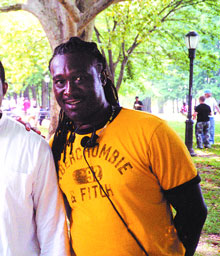People of Color in Crisis hosts celebrations to spotlight HIV prevention agenda
This year’s Pride Month, in June, is fast becoming a distant memory for most New Yorkers, but another public festival celebrating gay and lesbian life is on the horizon.
Only this time, the accent is more on “life” than on anything else.
From August 5 to 8, People of Color in Crisis (POCC), a 15-year-old organization providing HIV/AIDS prevention and support services to the African American community in New York, hosts its third annual Pride in the City weekend. The goal of the event, which features a picnic in Brooklyn’s Fort Greene Park, a beach party at Jacob Riis Beach at Far Rockaway, and performances by Soul and House music singers like Kelly Price, is to contact, test and counsel as many black, gay and bisexual men as possible on HIV/AIDS prevention.
The event is sponsored by a number of federal, state and non-profit health agencies, including the U.S. Centers for Disease Control and Prevention, the New York State Department of Health, and Gay Men’s Health Crisis.
By now, the stark national statistics concerning HIV transmission in the African American community, particularly among black gay men, should be of no surprise to the general public, and certainly not to health care providers.
African Americans make up 41 percent of all AIDS cases reported in the United States, yet according to the U.S. Census Bureau, they comprise only 12 percent of the U.S. population, say researchers at the CDC.
Within the past year, attention-grabbing headlines about this issue have appeared in major news outlets, including The New York Times, and a spate of books, such as Jacob Levenson’s “The Secret Epidemic: The Story of AIDS and Black America,” have come out, translating the alarming numbers into real, human stories.
Yet, according to POCC executive director Gary English, many social service programs focused on stemming the spread of HIV are in need of a “paradigm shift” in the way they address AIDS prevention and education across communities.
“A lot of providers miss the mark because they’re doing events for themselves, not for the people,” he said.
English explained that his organization itself underwent a refocusing of efforts three years ago when it realized that it was not adequately reaching its target constituency to provide HIV testing, referrals and other support services.
For POCC, the paradigm shift came in the form of the first Pride in the City in 2002.
“It feeds our clients all year,” said English. “Right after Pride in the City we get a flood” of people coming in for testing and referrals.
“The days when you have a nurse in a white uniform are gone,” English said, expressing the difficulty his organization has faced in attracting clients who are not intimidated by the clinical and bureaucratic nature of office visits.
“What a great opportunity to meet people where they’re at,” he said. “Pride in the City takes health care out of the office and puts it in the park, on the beach, in a comfortable social setting. How else do you bring mass healthcare to the masses?”
At last year’s event, more than 100 people were tested for HIV, one third of whom turned out to be positive, said English. This year, POCC organizers have set a goal of testing 300 attendees.
“We can’t get 8,000 people to our office,” said English. “But it’s our constituency and we do what’s appropriate to their needs.”
Of particular interest for POCC is outreach to black gay men and transgendered folks who belong to the House Ball scene, the subculture characterized by voguing and battling families known as “houses,” which has become a widespread attraction even beyond the gay world.
“This is a community that is very marginalized,” said English, noting that ball participants tend to be younger gay men and transgenders whose often-unstable circumstances place them at higher risk for contracting the virus.
This year, as in previous years, Pride in the City will feature a “mini-ball,” complete with categories of competition such as “Butch Queen Vogue Fem” and “Team Sex Siren.”
Reflecting on last year’s ball, which drew 2,200 competitors, POCC expects a massive turnout.
Staff and volunteers will be on hand, then as throughout the weekend, to offer HIV testing.
“This event does a lot of different things on different levels,” said English. “It gives exposure to prevention messages, access to testing and referrals, and it’s a great way to form community.”


































